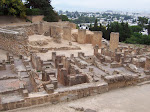
We also visited Hotel Sidi Dhriss, a troglodyte hotel that posed as Luke's Uncle's house in the first Star Wars film. Remember the scene where Luke eats his last meal with Uncle Owen and his wife? That's Hotel Sidi Dhriss. The bar scene where Luke meets Han Solo was filmed there, too.
Our next stop was to visit ksours, old grain storage buildings. They aren't used anymore but they are definitely fun to climb on. It was nice to be able to get out and stretch our legs because we still had a few hours until we reached Djerba. The ksours (ksar, singular) look like this:

A long bus ride later, we got to the eastern coast of southern Tunisia. There are two ways to get to Djerba from the mainland. A causeway built during the Roman Empire's reign in Tunisia is still in use. You can also catch a ferry. We drove our bus across the causeway and headed towards a town on the northern part of the island, Houmt Souk. Houmt Souk is one of the few "cities" on Djerba. The island itself is only about 20 by 25 kilometers, and most houses are just scattered across the island. Concentrated groups of residential housing just don't exist outside of Houmt Souk or Guellalla to the south.
Our hotel was an old fondouk, a place where travelers could live for a short time. There are fondouks scattered around Tunis as well, and historically they were organized by nationality. There was a French fondouk in the medina, a German one, an American one, and when diplomats or other important visitors came to Tunisia they would stay in the appropriate fondouk. They all seem to look pretty similar, with a central courtyard surrounded by rooms. Our hotel had a pool in the courtyard, a restaurant and a bar. Courtney and Sarah and I ended up with the largest room, with four beds and three rooms! One of the other girls had gotten sick that day so Lindsay, the girl she was planning to room with, stayed with us too because we had an extra bed.
By the time we got to Djerba it was already evening so we explored the Houmt Souk medina. Djerba is an interesting place in the sense that there's a bigger clash here between tourism and traditional life than anywhere else. The island has a large population of Ibadites, a Muslim sect that broke from both Sunnis and Shiites following the death of Mohammed. They are a rather conservative group and they share the island with an orthodox Jewish population as well. While the two groups live peacefully amongst each other, the advent of tourism has had an interesting effect. Djerba would be a largely conservative, traditional place had it not become such a hotspot for vacationers. Younger generations are breaking with the traditions of their parents, starting up businesses to appeal to tourists and making money while older generations try to maintain their traditions and conservative ideals.
After walking around the medina for a while, Courtney and Sarah and I stopped at a patisserie to get coffee and dessert. We noticed that the entire patisserie was filled only with men. We were the only women in the entire place. In Tunis and the surrounding areas, women are less discouraged from entering the public sphere, you see young women with young men in restaurants or patisseries or cafes all the time. In Djerba, if we did see women out, they were walking in groups together without men and didn't enter any of the public establishments. Our experience just reiterated the strange cultural clash we felt on the island.
Once we finished eating dessert first, we returned to our fondouk for pasta and couscous. We all went to bed pretty early that night, because tomorrow we had a "drop off" activity on the island.

Say what you will about Wikipedia, but when I searched "troglodyte definition" in Google, it was the only source I found that included your usage as part of the definition of "troglodyte" e.g., "One of a group of people who built homes into the faces of cliffs, connected by underground passageways, such as in France or Tunisia."
ReplyDeleteMost had much narrower or negative (and arguably inaccurate) definitions such as "caveman" or "a member of a fabulous or prehistoric race of people that lived in caves, dens, or holes" or "a person considered to be reclusive, reactionary, out of date, or brutish."
So, among other things, you are broadening our (or at least my) understanding of the english language.
Fun reading.
The first part of the post before the first few pictures was really interesting... and then after that it started to spiral out of control into nerd-dom with all the Star Wars jibberish.
ReplyDeleteIt was funny that you mentioned climbing since you've said it in previous posts. For some reason I have a feeling you were part monkey growing up, just a hunch. :P
I really liked the entire story to and in Djerba. :)